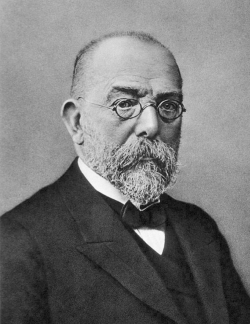Dr Robert Koch

- Born
- 11 December 1843
- Died
- 27 May 1910 (age 66)
Dr Robert Koch was a German microbiologist and Nobel laureate who is widely regarded as the founder of modern bacteriology. Notably, he isolated the bacteria that cause diseases such as tuberculosis, cholera and anthrax, which in consequent years has helped to diagnose and treat millions of patients.
Robert Koch was born in 1843 in Germany. His family was largely non-academic and he surprised his parents at the young age of 5 when he taught himself how to read from a newspaper. This was to set a precedent for his intelligence and scientific rigour later in life.
Attending the University of Göttingen in 1862, he soon became influenced by his professor of anatomy, Dr Jacob Henle, who only 20 years earlier proposed that infectious diseases were caused by living organisms (bacteria). In 1872 he became District Medical Officer in the town of Wollstein, a chapter in his life that was to change the future of medicine.
Anthrax at the time was prevalent in Wollstein among farm animals and Koch took it upon himself to study the disease despite not having facilities to do so. His four-roomed flat became his laboratory and, apart from the microscope bought for him by his wife, Koch provided all the lab equipment himself.
Anthrax, often a lethal disease, normally occurs in animals although can be passed on to humans through contact with the infected animal. Koch, in his makeshift lab, developed a new experimental method for testing whether a particular microorganism is responsible for a disease. He successfully isolated the bacterium Bacillus anthracis and showed that it was responsible for anthrax.
On the evening of 24th March 1882, Koch held a lecture to present his discovery of Mycobacterium tuberculosis, the bacterium that causes tuberculosis (TB). His findings were so monumental it is said he stunned his audience 'into silence'. For his achievements in the 'investigations and discoveries in relation to tuberculosis' Koch received a Nobel Prize in Physiology or Medicine in 1905.
If the importance of a disease for mankind is measured by the number of fatalities it causes, then tuberculosis must be considered much more important than those most feared infectious diseases, plague, cholera and the like.
Robert Koch, in a lecture on the discovery of the TB causing bacterium, 1882
Koch also developed solid mediums using gelatine and agar on which he could grow and study bacteria. Such improvements led to the development of the Petri dish by Koch's assistant Julius Petri. Thanks to Koch's developments of the staining and examination of bacteria, subsequent researchers have been able to identify bacteria responsible for typhus, tetanus and the plague. The identification of such bacteria has been instrumental in saving lives through developing tests and antibiotics to treat and manage these diseases.
In 1891 Koch set up the Robert Koch Institute for infectious diseases in Berlin, which is still the central federal institution responsible for disease control and prevention in Germany.



